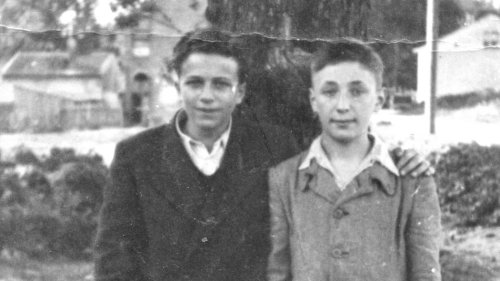The Teenage Gun Smuggler
Irving Milchberg watched his father die right before his eyes when he was 15 years old. A Nazi officer discovered that the elder Milchberg was hiding bread, so he gave him a running start and shot him in the back.
Not long afterward, Irving was arrested and put aboard a train to the Treblinka extermination camp. He managed to escape and returned home, only to find that his mother and sisters were gone. They would all be killed at Treblinka themselves.
Irving Milchberg was an orphan looking for a way to survive. The blue-eyed Jewish boy who was a resident of Warsaw’s infamous ghetto had to find a way to survive. So he, and a dozen or so other orphaned Jewish children, would pretend to be “Aryans” and sell cigarettes in Three Crosses Square. Given the nickname “Bull,” Mr. Milchberg would spend a year-and-a-half avoiding the Gestapo and informants in order to make a living while also smuggling food, supplies, and weapons into the ghetto. The square where they worked as literally surrounded by Nazis with buildings occupied by SS troops, German gendarmerie, German-led Hungarian troops, and a Gestapo office.
On April 19, 1943, Mr. Milchberg had gotten word that the Nazis were going to “celebrate” the Fuhrer’s 54th birthday the following day by liquidating the ghetto. He made his way back from the square and informed his uncle, his only surviving relative. They hid with other families in a bunker as the Germans began their attack. During the fighting between the troops and the Jewish opposition, known now as the Warsaw Ghetto Uprising, Mr. Milchberg recalled how his uncle insisted on celebrating the Passover seder: “You may die, but if you die, you’ll die as a Jew. If we live, we live as Jews. If you live, you’ll tell your children and grandchildren about this.”
Mr. Milchberg did live, but after the uprising ended in May 1943 he was captured and placed aboard a train to the Poniatowa camp. The train was accidentally switched on the tracks and Mr. Milchberg was able to escape once again. After receiving medical help for an injured leg from a Polish doctor who he knew before the war, Mr. Milchberg and the other cigarette sellers lay in hiding until the liberation of Warsaw by the Soviet Army in January 1945.
Mr. Milchberg fled to Czechoslovakia and then found his way to Austria where he stayed in a refugee camp. It was here that he learned to repair watches. In 1947 he was among 1,000 young Germans who were given permission to move to Canada. Settling in the town of Niagara Falls, he opened a jewelry and watch shop and work there until retiring to Toronto.
Irving Milchberg died on January 26, 2014 at the age of 86.
(Image of Irving Milchberg, left, and another cigarette seller known only by the name “Conky” is courtesy of the New York Times)
Other posts of relevance:
Boruch Spiegel - Started the Warsaw Ghetto Uprising
Jean Julich - Member of the “Edelweiss Pirates” a youth-run German resistance group

No comments:
Post a Comment